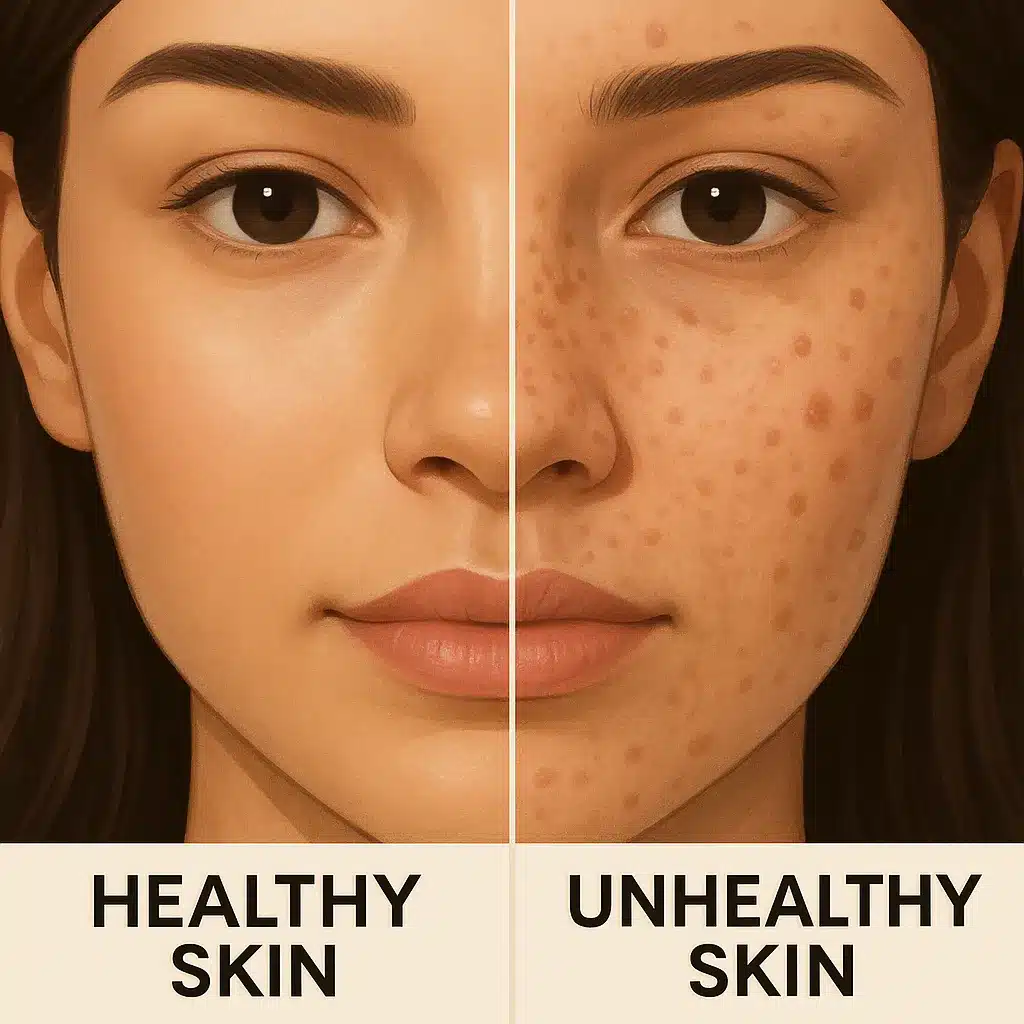
Approx. read time: 6.9 min.
Post: Skin 5 Ways to Build Healthy Glowing Skin Naturally
Healthy vs unhealthy skin. We often think of skincare as what we put on our faces—serumums, creams, masks, and toners. But the truth is, skin health runs deeper. What we eat, how we live, and the ingredients we expose our bodies to all shape the way our skin looks and ages. And knowing that everything we put on our skin gets absorbed, it’s crucial to pay attention not just to our self-care routines, but to the quality of the products we use and the lifestyles we lead.
So, how do you build healthy, beautiful skin that holds up over time? It comes down to three essential layers of care: nutrition, non-toxic skin care, and supportive daily habits.
Let’s break it all down.
1. Start with What You Eat: Nutrition Is Skin Fuel
Your skin is your largest organ. It’s made of millions of cells that rely on the nutrients you feed them. Every bite of food either helps your skin heal, regenerate, and glow—or pushes it toward inflammation, dullness, and early aging.
The Best Nutrients for Radiant Skin
- Omega-3 Fatty Acids
These healthy fats reduce inflammation, prevent dryness, and keep skin soft and smooth. Find them in salmon, flaxseed, chia seeds, and walnuts. - Vitamin C
A powerful antioxidant that helps your skin build collagen, reduce dark spots, and repair damage from sun exposure. Best sources: oranges, strawberries, bell peppers, and kiwi. - Vitamin A
Essential for skin cell turnover and clarity. Think: sweet potatoes, carrots, spinach, and kale. - Zinc
Helps heal acne, reduce redness, and repair damaged skin. Rich sources include pumpkin seeds, chickpeas, lentils, and oysters. - Vitamin E
An antioxidant that helps protect skin cells from damage and keeps skin moist and supple. Found in almonds, sunflower seeds, and avocado. - Water
Dehydrated skin looks dull, flaky, and wrinkled. Hydration starts with drinking enough clean, mineral-rich water daily.
Foods to Limit or Avoid
- Refined sugar: Breaks down collagen and leads to premature aging.
- Highly processed foods: They often contain additives and preservatives that can inflame your system.
- Alcohol: Dehydrates your skin and disrupts hormone balance.
- Dairy (for some people): Can trigger breakouts and inflammation, especially if it’s heavily processed.
2. Clean Skin Care: What You Put On Matters-Healthy vs Unhealthy skin
Your skin absorbs what you put on it—lotions, creams, sunscreens, perfumes, all of it. Many mainstream skincare products contain synthetic fragrances, endocrine disruptors, and preservatives that can do more harm than good.
Build a Natural Skin-Care Routine
You don’t need a dozen products. Just a few clean, effective steps:
Cleanse Gently
- Try oil cleansing with jojoba, sweet almond, or olive oil. It removes dirt and makeup without stripping your skin’s natural barrier.
- Avoid foaming cleansers with sulfates—they’re drying and harsh.
Moisturize Deeply
- Use raw shea butter, rosehip oil, or argan oil to deeply hydrate and nourish.
- Aloe vera gel is also great for calming and healing irritated or sensitive skin.
Exfoliate (but not too much)
- Use natural exfoliants like ground oats, finely milled coffee, or a gentle papaya enzyme mask once or twice a week. Over-exfoliating leads to irritation and barrier damage.
Protect from the Sun
- Choose a non-nano zinc oxide sunscreen that physically blocks UV rays without toxic chemicals like oxybenzone or octinoxate.
- Wear a wide-brimmed hat and stay out of harsh sun during peak hours.
3. Supportive Habits for Long-Term Skin Health
Even if you eat clean and use the best products, your skin will still show signs of stress if you’re burning the candle at both ends or ignoring basic wellness.
Prioritize Sleep
Your body does most of its repair and regeneration while you sleep. Aim for 7–9 hours a night, and try to keep a consistent sleep schedule.
Reduce Stress
Stress increases cortisol, which can wreak havoc on your skin—causing breakouts, dullness, or even flare-ups of conditions like eczema and psoriasis.
Ways to manage stress:
- Breathwork or meditation (even 5 minutes a day)
- Journaling
- Nature walks
- Creative expression (drawing, writing, music)
Move Your Body
Exercise boosts circulation, which helps deliver oxygen and nutrients to your skin. It also flushes out toxins through sweat and helps regulate hormones that affect skin clarity and tone.
Don’t Smoke
Smoking destroys collagen and elastin, causes wrinkles, and depletes your skin of oxygen. If you’re serious about skin health, this is non-negotiable.
4. Natural Remedies That Work-Healthy vs Unhealthy skin
You don’t need a 20-step routine or expensive products to get glowing skin. In fact, some of the best skin allies are found in your kitchen or garden.
Face Oils
- Rosehip Oil: High in vitamin A and C, it helps fade scars, boost collagen, and even out skin tone.
- Argan Oil: Packed with vitamin E, it hydrates without clogging pores and improves elasticity.
Simple Masks
- Raw Honey Mask: Antibacterial and deeply hydrating. Apply a thin layer to your face, leave for 15 minutes, then rinse.
- Turmeric & Yogurt Mask: Brightens skin and calms inflammation. Mix 1 tsp turmeric with 2 tbsp plain yogurt and apply weekly.
DIY Toners
- Green Tea: Soothes redness and fights free radicals. Brew, cool, and apply with a cotton pad.
- Apple Cider Vinegar (diluted 1:3 with water): Restores pH and clears up breakouts. Use only a couple of times a week to avoid dryness.
5. Herbal and Supplemental Support
Certain herbs and supplements can help maintain your skin from within, especially as you age and natural collagen production slows.
- Gotu Kola: A powerful herb known to support collagen and improve circulation.
- Nettle Leaf Tea: Rich in minerals like silica and zinc—great for skin, hair, and nails.
- Collagen Peptides: A high-quality collagen supplement can support skin elasticity and reduce fine lines.
- Ashwagandha: An adaptogen that helps your body manage stress and balance hormones—both of which affect your skin.
Final Thoughts: Skin Health is a Daily Investment
There’s no overnight fix for radiant, strong skin. It’s built through daily choices: what you eat, how you sleep, what you put on your body, how you move, and how you handle stress. Healthy skin is resilient, not just pretty—it protects, heals, and reflects your internal well-being.
The more natural and mindful your approach, the better your skin will age. Clean food. Clean products. Clean habits.
If you treat your skin like part of your overall health—not just a surface to polish—you’ll see the results.
Final Thoughts: Skin Health Is Built, Not Bought
Great skin isn’t a lucky accident or the result of expensive products—it’s something you build through consistent choices. Every day, your skin reflects how you eat, how you live, and what you put on your body. That’s the truth. There’s no magic serum that can replace sleep, good food, or a balanced life.
So if you want skin that not only looks good but feels good—strong, clear, glowing, and resilient—you need to approach it from the inside out. Nourish it with real food. Protect it with clean, gentle ingredients. Support it with sleep, hydration, movement, and stress management. And most importantly, listen to it.
Glowing skin is not about chasing perfection—it’s about building strength and balance over time. It’s about reducing the toxic load your body has to fight, giving your cells what they need to regenerate, and honoring the signals your skin gives you when something’s off.
A breakout? That’s communication. Dryness? That’s a signal. Dullness? Your skin is asking for support. When you treat your skin like a living, intelligent system—not just a canvas to cover up—you begin to see long-lasting, visible change.
So ditch the quick fixes. Focus on long-term health. Build habits that support your skin for life, not just a season. Because the most powerful beauty routine is one rooted in health, consistency, and care.
Your skin is always working for you. It’s time to return the favor.
Related Videos:
Related Posts:
Hippocampus Health and Aging 7 Powerful Strategies
In and out of Love: The 7 Truths Behind it All
Pride in Religion: Healthy vs Unhealthy
Yearly Blood Work Benefits: 10 Reasons It’s Essential for Health and Prevention
Breakthrough Guide to Parent-Child Relationship Repair: How to Rebuild Trust and Connection










